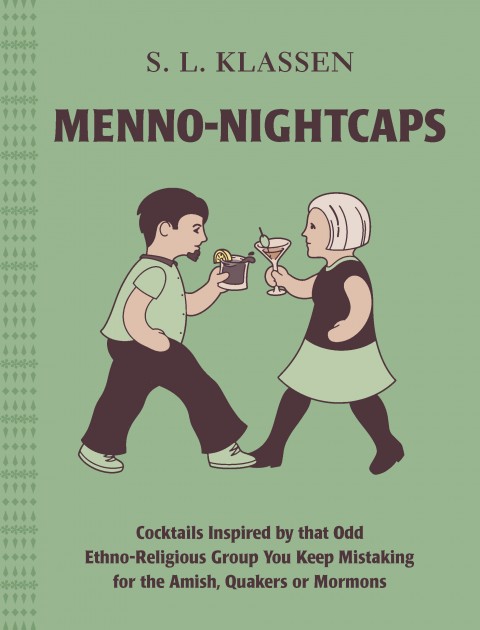 This post was first published on the old site in 2015. I’ve reworked it a bit but the cocktail’s the same.
This post was first published on the old site in 2015. I’ve reworked it a bit but the cocktail’s the same.
I read Miriam Toews’ A Complicated Kindness when it first came out in 2004. It made a bit of a stir in the Mennonite world at the time — that awkward mixture of pride over success and embarrassment over the unflattering image of all things Mennonite that we would rather ignore. I am of the opinion that if Irish Catholics can live with unflattering literature, then all brands of Mennonite should be able to also.* We are, after all, supposed to be humble.
Particularly irritating to some Mennonite readers was the misrepresentation of our beliefs and history. The novel is written in first person in the voice of a sixteen-year old girl who, yes, didn’t know her Mennonite history. I might have missed a factoid or two but I’m pretty sure that every tidbit of history that our narrator Nomi Nickels passes on to the reader is either an outright falsehood or a gross exaggeration. She didn’t even know the standard narrative. I expect that Miriam Toews did know the standard narrative, or at least has the googling chops to discover GAMEO and learn it. But the adolescent narrator was not known to pay attention in class. She wasn’t particularly smart and she wasn’t particularly knowledgeable.
Mennonites, of course, worry that the non-Mennonite reader won’t recognize the falsity in the teen narrator’s facts. But that’s par for the course with fiction. To me, the outrageous falsehoods added to the humour. It goes a way in explaining why the Mennonites I know found the book funnier than the non-Mennonites. Nomi is not a stupid girl but neither is she particularly brilliant. Adolescents in fiction are often precocious figures who are special in one way or another. They don’t fit into their parochial environment and need to escape their confines. Nomi’s older sister fit this bill, getting a library card as her first step away from the community of her birth. But this novel isn’t about the brilliant and the exceptional adolescents who get away. It’s about the fairly ordinary girl who didn’t.
A Complicated Kindness is about a girl who is left behind. It can, in fact, be seen as a subversive retelling of the nightmare familiar to any who grew up close to an evangelical Protestant faith, of discovering that the Rapture had happened and that all of your family was taken but you were found wanting. The novel is apocalyptic, not in the Buffy the Vampire Slayer or zombie meaning of the word, or even the mainstream Protestant view of the end times, but in the sense of a personal apocalypse where one by one family and social ties fall apart until one is left alone to decide her own fate, to participate in one’s own salvation or damnation, by choice. In Nomi’s case, this followed a dramatic storm, where the manhole covers “popped up like champagne corks.”
How apocalyptic is that?
Though castigated by many a Manitoba Mennonite, the novel’s insistence on adult decision-making stripped bare of social (and even family) pressures is uncomfortably Anabaptist. We forget that when we preach community and “Christian formation,” but it’s there every time we nod our head at a portrait of Conrad Grebel or prop up a window with our copy of the Martyr’s Mirror. Few of us see our lives stripped as barren as Nomi’s but we all come to some place as we broach adulthood where we need to loosen those bonds to experience our own apocalypse and decide our own fate.
We meet Nomi near the end of her final year of high school. Her family having mostly disintegrated, we watch her turn not so much rebellious as desperate, the meaning and all hope of meaning having been wrenched from her life when she saw both her faith and her family as resting upon lies and a kindness that was really too complicated to reach her. And so she fills the emptiness left within her with sensation wrought by tobacco, pot, sex and, of course, booze. Mostly beer and some wine that she and her boyfriend buy in the neighbouring French village. Nomi’s not the only alcohol-swilling character in the novel. It comes up from time to time, my favorite being her grandmother who manages to get drunk on vanilla extract to numb the pain of a parent’s disappointment in a son gone dogmatic and a daughter just gone. I can’t help but feel for the poor woman and the impossibility of drowning one’s sorrows with little bottles of vanilla, one after another.
For the record, I’d just like to say that the Drunken Menno does not advocate drinking to fill the emptiness within you. At least, not all that often.
Today’s cocktail is a tribute to this grandmother, to Nomi, and even to her nemesis Uncle Hans aka The Mouth. For the grandmother, it’s rich with vanilla; for Nomi, it’s got beer, the preferred beverage of teens hanging out in the pits everywhere; for the Mouth, it’s got ice cream — the preacher’s own go-to pleasure for filling in the emptiness that running a community can’t satisfy. That’s right, it’s a Vanilla Porter ice cream float representing the push and pull of adolescence that straddles childhood fantasies and the adult self-actualizing activity of setting out and telling your own story in your own voice, with beautiful lies of your own choosing.
The Nomi Nickel
2 scoops good quality vanilla ice cream
1/2 oz whiskey
1/2 oz vanilla extract
Vanilla Porter
- Mix together the whiskey and the vanilla extract and set aside
- Place one scoop of ice cream in a chilled beer mug
- Drizzle half of the whiskey/vanilla mixture over the ice cream
- Fill the mug half way with vanilla porter
- Add another scoop of ice cream and drizzle the remainder of the whiskey/vanilla over it
- Add more beer as needed to fill the mug and top with a cocktail cherry
*From the theological stance and the form of shunning practiced, I suspect that Miriam Toews was referring to a childhood among the Evangelical Mennonite Conference, commonly known as the Kleine Gemeinde. I’m not that kind of Mennonite.



Thanks so much for explaining my cousin’s awful book to me. Miriam Toews was a little younger than us, and I lived in the big city, she on the outskirts of Steinbach. We rarely saw her and her family, so perhaps I should not have been surprised to see how she vilified various members of our family, who really were never anything but kind to her as a little girl. She and her family chose not to be part of the community, despite charitable efforts to include them in family gatherings. In particular, my uncle Art, who had been born a second twin with fetal anoxia and struggled lifelong with epilepsy, in an era where there were no good medications. She calls him her “idiot cousin”. Art died shortly after the book came out, and was mortified by her betrayal. He actually had a very high IQ, and an even larger heart. He had always greeted Miriam warmly from the little booth where he sold lottery tickets. The book is full of lies like that.
Hi Lori Ann,
Thanks for reading my blog. I haven’t actually read any of Miriam Toews’ non-fiction and so have not come across references to your family. I also have never met her and can’t speak for her. Coming from a large family of cousins myself, I do know that my own subjective experience is often different from others’ even within the family. I expect that I have been on both sides of giving kindness that wasn’t received well and of not always receiving well what was meant as kindness.